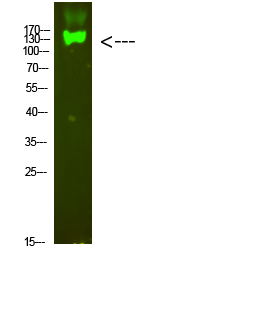
| WB | 咨询技术 | Human,Mouse,Rat |
| IF | 咨询技术 | Human,Mouse,Rat |
| IHC | 咨询技术 | Human,Mouse,Rat |
| ICC | 技术咨询 | Human,Mouse,Rat |
| FCM | 咨询技术 | Human,Mouse,Rat |
| Elisa | 1/10000 | Human,Mouse,Rat |
| Aliases | Integrin beta-7 (Gut homing receptor beta subunit) |
| Entrez GeneID | 3695 |
| WB Predicted band size | Calculated MW: 87 kDa; Observed MW: 130 kDa |
| Host/Isotype | Rabbit IgG |
| Antibody Type | Primary antibody |
| Storage | Store at 4°C short term. Aliquot and store at -20°C long term. Avoid freeze/thaw cycles. |
| Species Reactivity | Human,Mouse |
| Immunogen | Synthesized peptide derived from human Integrin β7. at AA range: 671-720 |
| Formulation | Purified antibody in PBS with 0.05% sodium azide,0.5%BSA and 50% glycerol. |
+ +
以下是关于Integrin beta 7抗体的3篇代表性文献摘要:
1. **"Integrin β7 is required for intestinal lymphocyte homing and protection against colitis in mice"**
- **作者**:Wagner, N. 等
- **摘要**:研究通过β7基因缺陷小鼠模型,发现Integrin β7对淋巴细胞归巢至肠道黏膜至关重要。缺乏β7的小鼠表现出肠道淋巴细胞减少,并更易发生实验性结肠炎,表明β7在肠道免疫稳态中的作用。
2. **"α4β7 integrin mediates lymphocyte binding to the mucosal vascular addressin MAdCAM-1"**
- **作者**:Berlin, C. 等
- **摘要**:该文献首次证实α4β7整合素作为肠道归巢受体的功能,通过特异性结合黏膜地址素MAdCAM-1.介导淋巴细胞迁移至肠道炎症部位,为炎症性肠病治疗靶点提供理论基础。
3. **"Targeting integrin β7 for the treatment of inflammatory bowel disease"**
- **作者**:Pullen, N. 等
- **摘要**:探讨抗Integrin β7抗体在炎症性肠病(IBD)治疗中的应用潜力,通过阻断β7与MAdCAM-1的相互作用减少肠道炎症反应,动物实验显示其能显著缓解结肠炎症状。
这些研究覆盖了β7整合素的基础机制、病理作用及治疗应用方向。
Integrin beta 7 (β7) is a subunit of heterodimeric cell surface receptors that mediate cell-cell and cell-extracellular matrix interactions. It pairs with alpha subunits (α4 or αE) to form integrins α4β7 and αEβ7. which play critical roles in immune cell trafficking and mucosal immunity. Specifically, α4β7 binds to mucosal addressin cell adhesion molecule-1 (MAdCAM-1) expressed on gut endothelial cells, directing lymphocyte homing to intestinal tissues. αEβ7 interacts with E-cadherin on epithelial cells, promoting retention of intraepithelial lymphocytes in mucosal surfaces.
Antibodies targeting integrin β7 are primarily used in research and therapeutic contexts to modulate immune responses, particularly in gastrointestinal inflammation. They block β7-mediated adhesion and migration, offering insights into inflammatory bowel diseases (IBD) like Crohn’s disease and ulcerative colitis. Therapeutically, β7-specific antibodies (e.g., vedolizumab, which targets α4β7) are FDA-approved for IBD treatment, demonstrating efficacy by inhibiting leukocyte infiltration into inflamed gut tissues. Such antibodies also hold potential in studying autoimmune disorders, graft-versus-host disease, and cancer immunotherapy, where dysregulated cell trafficking contributes to pathology. Challenges include balancing immunosuppressive effects with infection risks. Overall, integrin β7 antibodies exemplify targeted immunomodulation, bridging mechanistic studies and clinical applications in mucosal immunity.
×